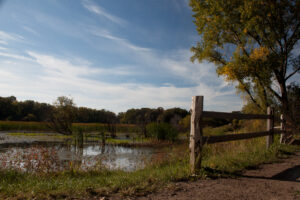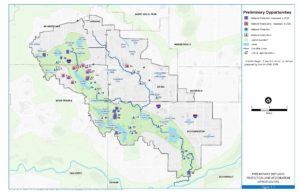Watershed-wide
ABOUT
The District conducted a study to identify high quality wetlands within the watershed. The purpose of the study was to identify high quality wetlands in the watershed, help staff and managers understand the functions and values of these wetlands, and identify specific wetland protection and restoration opportunities.
Background
The wetlands in the Nine Mile Creek watershed are of great value. Wetlands provide important functions including plant diversity and habitat for amphibians, fish and other wildlife. Wetlands also provide water quality improvement, flood protection, shoreline erosion control, ground water protection, and carbon sequestration. Additionally, wetlands provide opportunities for wildlife viewing, recreation, education, and cultural resources.
What did the wetland study find?

There were 40 opportunities for wetland protection and restoration identified through a search of wetland records and GIS analysis. From the original 40 wetlands identified, 21 site visits were conducted. Nine of these wetlands were evaluated as high priority wetland protection opportunities based on the site visit (Section 3.3.3, Results). To learn more about the processes used for site selection and the wetland sites, read the full Wetland Assessment Report (PDF).
Following the the identification of nine priority sites, the District moved forward to study four of the high-quality wetlands in more detail to identify potential projects that could improve wetland functionality and/or preserve wetland quality. These were all high-quality wetlands in need of protection or enhancement and not restoration. The four wetlands were: Whited Marsh (Minnetonka City ID #700), Minnetonka City ID #576A (also referred to as Rowland Road Wetland), Cranberry Bog Pond (Bloomington City ID #62-04), and Tierney’s Woods Pond SW (Bloomington City ID #59-06). Based on the information provided, the Nine Mile Creek Board of Managers chose to start work on the Whited Fen Restoration first. To learn more about these four sites, read the full High Quality Wetland Scoping, Prioritization, and Feasibility Report (PDF).
Questions?
For questions on the wetland study or White Fen, contact Brett, Project Manager, at 952-356-1999.
